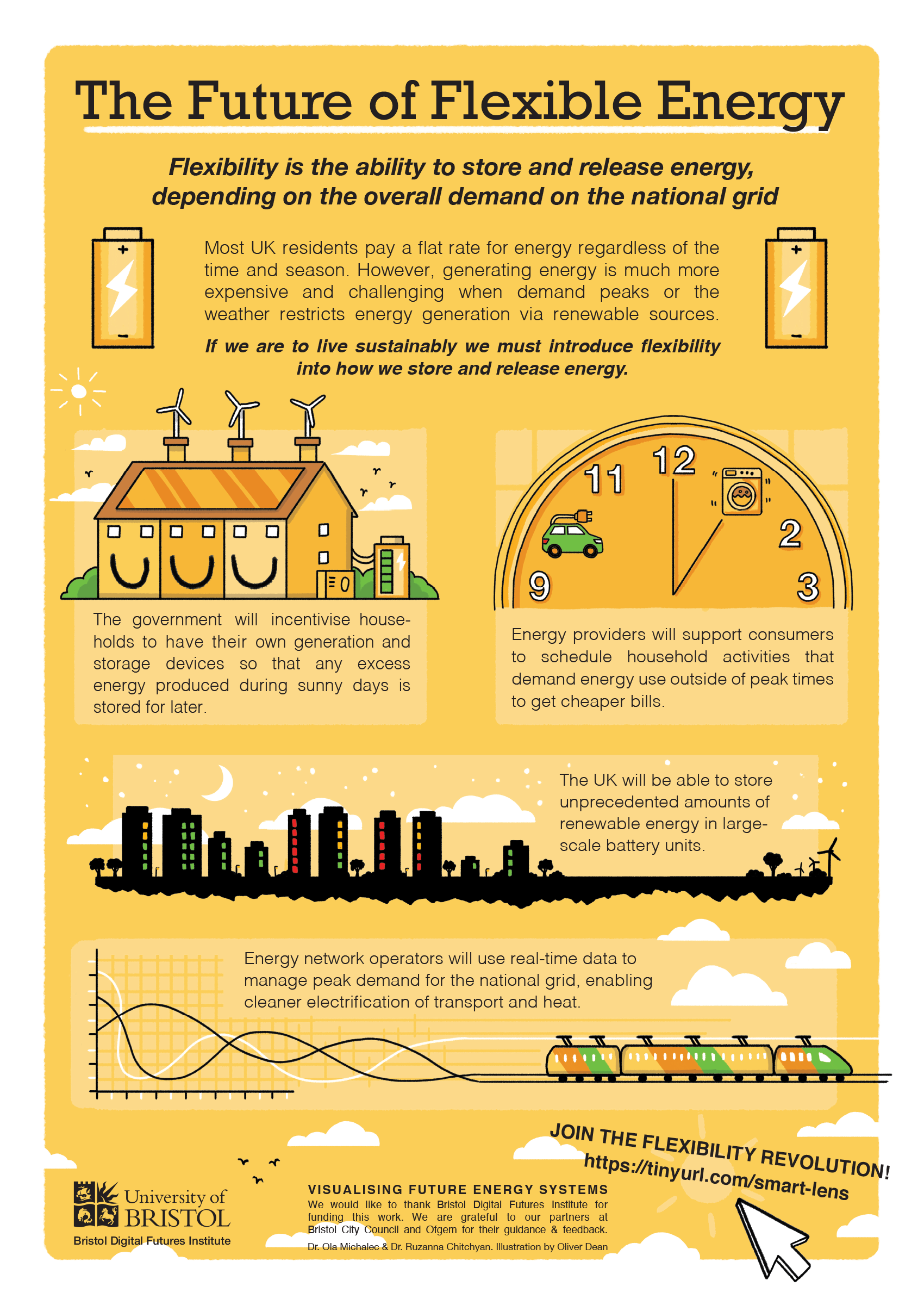Flexibility
Flexibility is the ability to store or release energy depending on the overall demand on the power grid.
What is flexibility?
The idea of flexibility in not new! Currently, the excess natural gas, coal and wood are held in reserves for cold winter evenings, but they come at a high cost to the planet! Sustainable flexibility will be enabled thanks to technologies, regulations and social norms supporting environmentally friendly living.
What are the examples of flexibility?
Flexible technologies like electric vehicles, solar panels and batteries can provide ‘flexibility services’ to electricity networks. By releasing power back to the grid at times of high demand, and storing it during times of lower demand, local 'flexibility services' unlock the full potential of renewable energy.
Flexible markets between citizens and energy network companies mean that people can bid to provide energy to the networks as well as each other. This energy could come from solar panels or might be stored in batteries.
Flexible lifestyles mean that at home you could use an app which monitors the price of electricity and schedules your household activities (laundry, dishes, car charging) outside of the peak demand times. Energy suppliers already offer flexibility apps and you can already purchase smart home equipment but they only make sense when you’re on a flexible ‘time of use’ tariff. In time of use tariffs, the price of energy varies throughout the day depending on demand.
What are the benefits of flexibility?
- As the UK is planning to electrify large proportions of its infrastructure (e.g. rail, cars and heating), it is predicted that this will generate the need for 40GW of energy over the next 10 years. Flexibility services will help to accommodate this new electricity demand.
- Flexibility services stabilise the grid, making it less reliant on the weather conditions. Since people use the most energy to heat their homes during cold snaps and long evenings in winter, we need to have spare capacity for extreme weather scenarios.
- Battery storage improves the overall efficiency of the grid by reducing idle generation of energy. Without storage, energy produced during windy and sunny days might go to waste.
- Flexible markets will help early adopters with reducing their bills as they are able to sell their excess energy.
- With time, flexible technologies will lower bills for everyone, not just those participating in flexibility markets! This is because it is expected that the local flexible technologies will replace the need to build new centralised infrastructure projects.
- Flexibility could help to meet decarbonisation goals with fewer resources. It is estimated that the cost of the electricity system in Great Britain could be reduced by £40 billion by 2050 with greater flexibility and the deployment of more energy storage.
What are we working on?
- Modern commercial batteries are not (yet) environmentally friendly. Lithium-ion mines also face criticism for poor labour conditions.
- The argument for saving money by building less centralised infrastructure relies on an assumption that individuals and communities will effectively invest in their own smart solutions, a future which is dependent on mass public acceptability of even enthusiasm towards flexibility.
- Energy sector stakeholders (regulators, suppliers) haven’t decided on the details of future energy tariffs. Currently most people use a flat energy tariff, meaning that their consumption costs the same regardless of the time in a day. This doesn’t reflect the true cost of energy, as during peak demand times energy is more expensive to generate. However, time of use tariffs are still in early phases and we’re not sure what would happen if they were to scale up. We still need to come up with the right pricing systems to build in justice into flexibility so everyone can afford to cook their meals and heat their homes.
- Not everyone can fully participate in flexibility services, whether due to the lack of time, poverty or mistrust towards new technologies. As a result, we risk excluding people from the sustainable transition. If delivering clean energy is a universal challenge, it is an imperative that we get everyone on board. Therefore, we need to avoid the traditional dynamics of innovation adoption, where only affluent people reap the benefits.
- Flexibility services will involve analytics and management of the large amounts of data. These actions need to be coordinated by regulators to ensure appropriate privacy, security and interoperability.

Further reading
- Briefing: Flexible energy systems – a short explainer by Carbon Trust
- Local Energy Oxfordshire – Benefits of Flexibility – an introduction to Project LEO, a local flexibility trial in Oxfordshire
